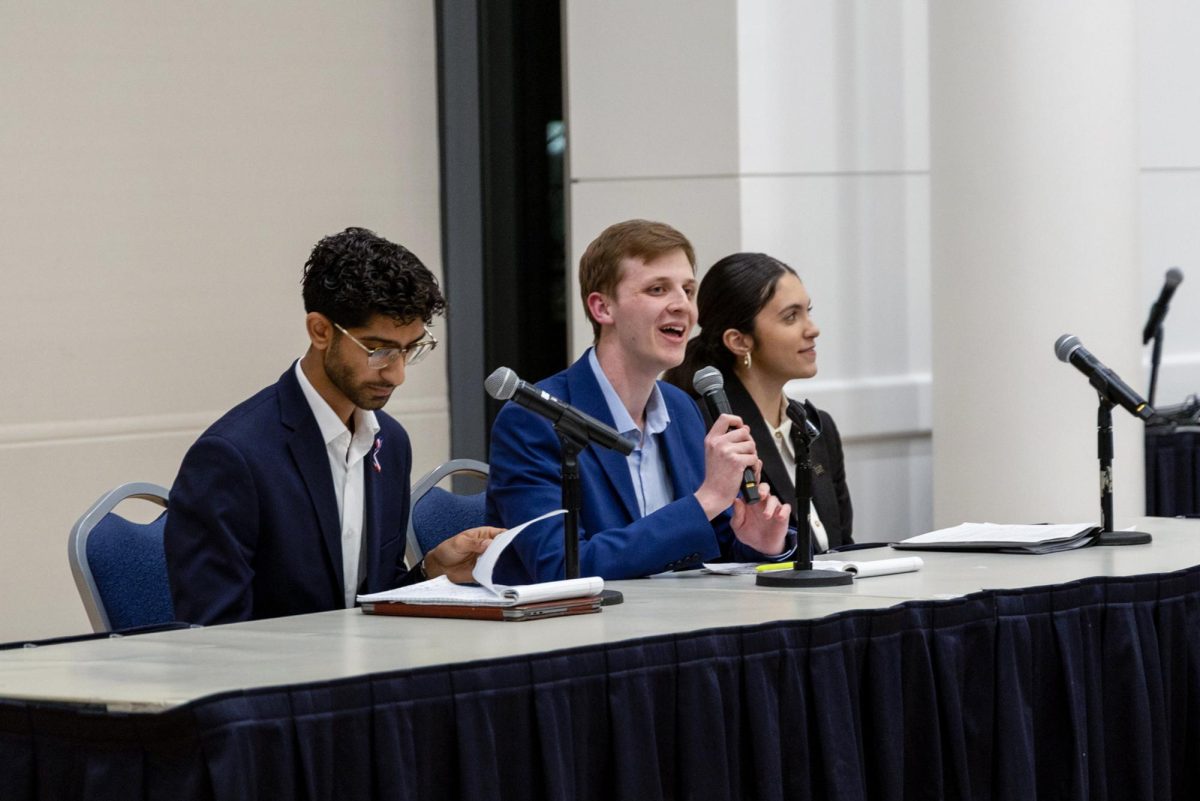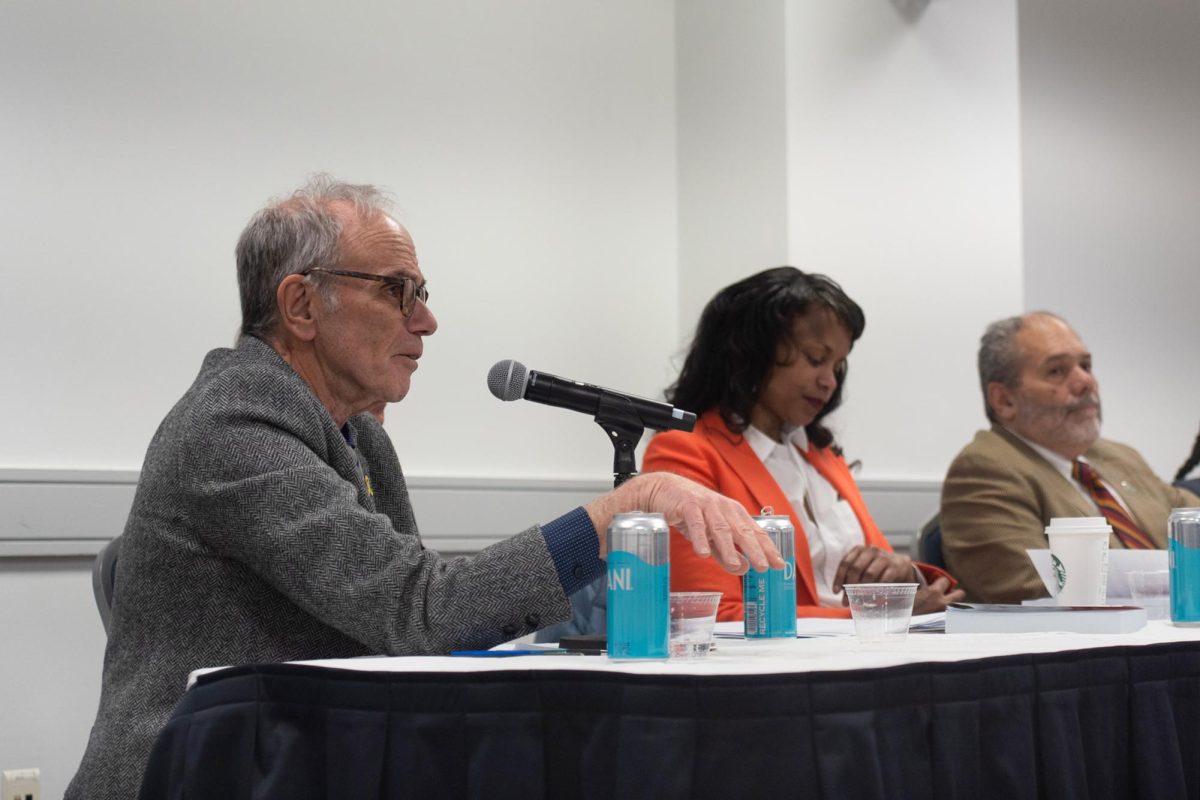In the two-and-a-half years since Doug Guthrie set out to revive a business school with financial strife and flagging rankings, some faculty say the dean has pulled the reins too close to his chest and shut faculty out of crucial decisions.
As Guthrie set out to stabilize the school’s budget, increasing fundraising and growing enrollment, some professors say his quick takeover and actions came off as power grabs. Some professors said he unfairly ratcheted up tenure standards, made decisions unilaterally and delayed efforts to gather their input – moves the dean said were necessary to raise the school’s ranking and revenue.
He took tighter financial control over the school’s departments, penning an emergency plan for the financially ailing business school his first year in the dean’s office and rejecting funding proposals from a handful of departments.
Guthrie also denied three of the four professors who were up for tenure last year, an unexpected decision that rankled faculty across the school, who said standards were raised to more highly scrutinize research, but the change was not well-communicated. Those tenure rejections were upheld by a Faculty Senate committee and the provost’s office.
Guthrie said he came in with a charge to shake up the school and knew it would lead to some discontent, especially with higher education in flux as student debt rises and online learning accelerates. His first task, he said, was keeping the school afloat financially, which forced him to move quickly on growing programs instead of forming a strategic planning group with faculty.
“The idea that we could just continue to do what we do and not change is ridiculous,” Guthrie said. “I was not only brought here with a mandate of making us into an elite school, but I have a responsibility to this school and this University to build a foundation for the future. That means we have to make some hard decisions.”
The dean’s office has calmed the grumblings lately through some appeasements, like programs that give non-tenured faculty time off in the summer to focus on research.
The school has also seen unusual turnover, with the entire advising staff departing in the past year and several top administrators leaving their posts. The departures, some of which were brought on by an advising revamp, have shaken up undergraduate advising and career services programs often considered models for success across the University.
Guthrie said he’s filled the financial hole he inherited with record fundraising and growing enrollment by 20 percent. He declined to say how large the deficit was when he entered the school or exactly how much he’s fundraised over the last two years.
His other efforts have had more mixed results.
Guthrie has echoed his big ambitions – pledging to put the business school on three continents and triple the number of endowed professors. Those goals have hit some roadblocks. The business school’s potential global program that would split undergraduates’ four years between China, France and D.C. has seen delays, and the school only hired one endowed chair last year.
GW also has not yet moved up in rankings, dropping two spots to No. 54 in Bloomberg Businessweek’s MBA rankings last month and slipping seven slots to No. 66 in the magazine’s undergraduate list last March. Students noted in Businessweek surveys that they experienced poor communication from administrators.
And some faculty say they have noticed there is a gap in trust with the dean’s office.
Fewer professors show up at faculty meetings now after Guthrie started a “command and control approach,” professor of tourism studies Douglas Frechtling said.
“We have a dean who came in who decided to institute radical changes for the purpose of raising the rating of the business school,” Frechtling said. “He has made a lot of changes and in my opinion – and like others who have complained – that he has consolidated control in his own office.”
Prabir Bagchi, a professor of operations and supply chain management, said without trust from faculty, Guthrie will face more resistance throughout his deanship.
“Change like that has to be made through and with the faculty. Trust has to be earned,” Bagchi said. “When you haven’t earned the faculty’s trust, you’re going to hit some barriers. You won’t be successful.”
University President Steven Knapp hired Guthrie, a China scholar and former New York University professor of management and sociology, as the school’s top official in May 2010 after 12-year dean Susan Phillips stepped down.
Since then, Guthrie has become an influential voice at the University, serving on GW’s strategic plan steering committee.
The opposition to Guthrie, part-time marketing professor David Ashley said, is natural. He added that while he likes Guthrie, he’s heard faculty complaints that the growing enrollment has ballooned class sizes.
“He’s trying not to have a completely academic approach, a little more running the business school like a business. Sometimes faculty don’t like that and it butts up against academia,” he said.
Other professors say the school needed change, and supported Guthrie’s initiatives like launching a master’s of finance program in China last year and starting a slate of online MBA programs. Programs like an executive education program for professional athletes that launched last year have also generated buzz.
Jennifer Spencer, chair of the international business department, said raising standards and a growing enrollment is part of Guthrie’s plan to improve the school’s bottom line and earn it prestige.
She said as the school will likely approve a new undergraduate curriculum this year and start its online programs, the changes will bloom.
“There’s going to be enthusiasm on those,” she said. “This will be a big year for things working.”
Guthrie will be up for faculty review, per the school’s bylaws, next semester because it is his third year as dean.
“I think it’s a healthy thing to me to get feedback from faculty and I’m looking forward to what they have to say,” Guthrie said.
Scrutiny has been fierce in faculty reviews at other schools. Columbian College of Arts and Sciences professors harshly criticized Dean Peg Barratt in a survey last spring, saying she failed to create an atmosphere of trust and lacked vision. Barratt announced a month later that she would step down in June 2013.
Vice Dean for Education and Programs Philip Wirtz, Guthrie’s second-in-command, said that some polarization stems from Guthrie’s history at NYU, where administrators typically take more of a “strong top-down” approach. GW, on the other hand, has stronger faculty governance.
Wirtz also said the two sides are beginning to work together. For instance, school’s executive committee, led by the dean, created a “faculty support account” that funnels money directly into research and teaching.
“If we dwell on the mistakes made in the past by both sides, the School will get mired in dysfunctional finger-pointing rather than drawing on the considerable forward momentum,” Wirtz said in an email. “It is unusual in the School’s history for the faculty to be challenged by a motivated dean to become better. But slowly we are seeing a growing – if begrudging – recognition by the faculty that this is a unique opportunity to move the School into the top tier.”
Cory Weinberg contributed to this report.






